Adil Najam
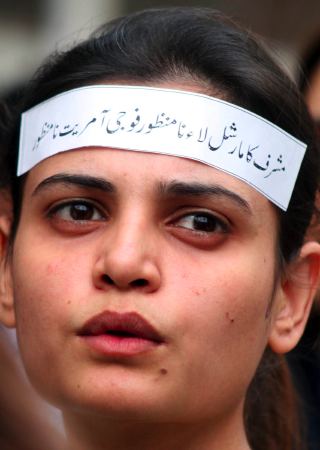 I have been traveling nearly non-stop over the last month, and events in Pakistan are headline news everywhere. More than that everyone is asking questions about Pakistan. An immigration official in Baku, Azerbaijan, asked me (2 weeks before the emergency) how long Musharraf will survive? A hotel receptionist in Musqat, Oman, asked more politely if “all is well in your country?” (one week before the emergency). In Pakistan (just days before the emergency) the question was more like “What is America planning for Pakistan?” A shop-keeper in Trondheim, Norway, asked (one day before the emergency) wondered if “Benazir will solve Pakistan’s problems?” And my driver in Cairo, Egypt, asked yesterday “Has Musharraf gone mad?”
I have been traveling nearly non-stop over the last month, and events in Pakistan are headline news everywhere. More than that everyone is asking questions about Pakistan. An immigration official in Baku, Azerbaijan, asked me (2 weeks before the emergency) how long Musharraf will survive? A hotel receptionist in Musqat, Oman, asked more politely if “all is well in your country?” (one week before the emergency). In Pakistan (just days before the emergency) the question was more like “What is America planning for Pakistan?” A shop-keeper in Trondheim, Norway, asked (one day before the emergency) wondered if “Benazir will solve Pakistan’s problems?” And my driver in Cairo, Egypt, asked yesterday “Has Musharraf gone mad?”
You have to be impressed by how much ordinary people around the world know about Pakistan. But also sad that this is what they are thinking when they think Pakistan.
I do not think I have been able to respond to any of them satisfactorily. Politics in Pakistan is way too complex, even for us Pakistanis.
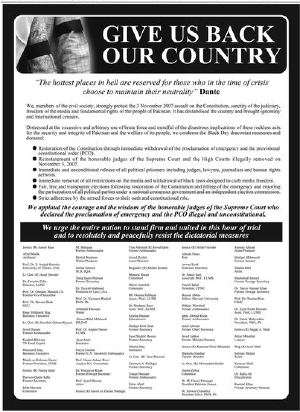 But to each I have said, in different ways, that the real story in Pakistan is not about Gen. Pervez Musharraf. The real story is about Pakistanis demanding democracy. The reason the general has had to use ever increasing pressure and more draconian measures is precisely because the people who want democracy are just not giving up. As we have said before, here is a democratic society trapped in an undemocratic state. This is a moment to be proud of Pakistanis. The failure here is not of Pakistan. It is of Gen. Pervez Musharraf (and he wrote his own indictment in his ’emergency’ speech).
But to each I have said, in different ways, that the real story in Pakistan is not about Gen. Pervez Musharraf. The real story is about Pakistanis demanding democracy. The reason the general has had to use ever increasing pressure and more draconian measures is precisely because the people who want democracy are just not giving up. As we have said before, here is a democratic society trapped in an undemocratic state. This is a moment to be proud of Pakistanis. The failure here is not of Pakistan. It is of Gen. Pervez Musharraf (and he wrote his own indictment in his ’emergency’ speech).
And this is what is most heartening. In response to a journalists question yesterday, I elaborated on something I have been saying already (here, here and here):
…this is a moment of great pride for Pakistanis. How can you not be proud of your people when ordinary citizens – lawyers, journalists, students – come out on he streets ready to be beaten up and put in jail… knowing that they will be crushed and yet demanding democracy…. this is NOT Pakistan’s failure… this is a moment of success for Pakistan’s people… the reason that the military government has been forced to apply ever greater force and every more draconian measures is simply because the democracy forces in the country (the lawyers, the students and journalists… unfortunately not the politicians as much) are simply unwilling to bow down. In the past people used to stop demanding democracy at much less pressure than this. Now they are resisting pressure and they keep demanding democracy and freedom.
Even as I travel (still on the road) and check email on unreliable connections and unfamiliar computers, I find my inbox and the comments on ATP innundated with information about what ordinary citizens are doing. This is most heartening.
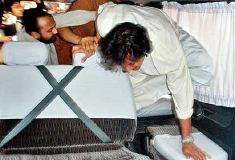
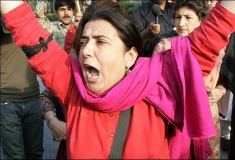

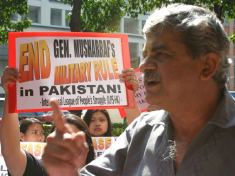
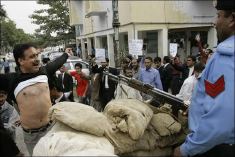
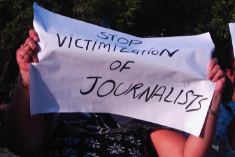
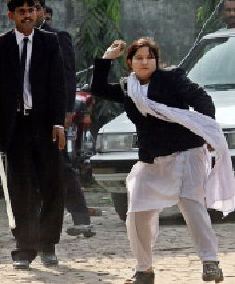
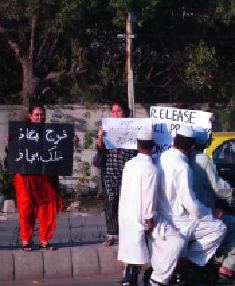


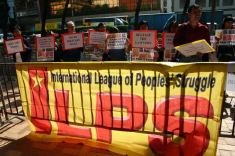
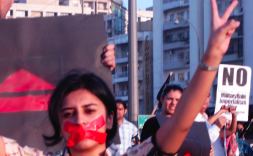
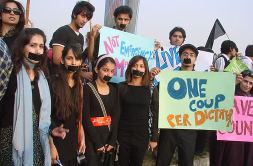
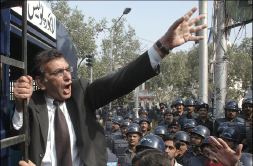
The pictures say it all and I will let the pictures do the talking here. But as I look at teh pictures, some points do pop into the head about who is protesting here and who is not. Maybe our readers can comment more on this:
- Note carefully who is protesting for freedom, human dignity and democracy. These are ordinary people. Lawyers. Students. Journalists.
- Note carefully who they represent. These are amongst the most so-called ‘secular’ and ‘liberal’ classes in society. The people who were supposed to be Gen. Musharraf natural constituency. Musharraf has lost the support of the very people who were supposed to be (but never really were) most aligned to him. [Readers, please spare us your diatribes and fatwas about what ‘secular’ and ‘liberal’ means. Despite the propaganda from some, neither of those terms means anti-religious or un-Islamic… There is a huge literature on this, so please read it. But, for Allah’s sake, not on Wikipedia!!].
- Note also the solidarity being shown by Pakistanis within and outside Pakistan. While there are obviously those who do support the general, the opposition to the emergency is more widespread than anything one can remember. One can scarcely think of any political act that has united our otherwise divided society they way the general opposition to the Emergency has.
- More importantly, please note who is NOT in the pictures. Who is not on the streets protesting.
- Political activists and political leaders are not on the streets. They make statements, but half-heartedly. This is not a movement led by politicians. In fact, it is not even clear whether the politicians are smart enough to just follow the people on the streets. Really conspicuous by their absence are the ‘political workers’. The Million who greeted Benazir, or were supposedly stopped from greeting Nawaz Sharif, or routinely come out for the MMA, are nowhere to be seen. Their leaders have failed to mobilize them, or maybe not tried to do so at all.
- The one exception to the above may be Imran Khan, but I have long felt that at his core he is more of a civil society actor than a political leader in the true sense; his stance, his style, and even his vote bank seems to suggest the same.
- Also conspicuous by their absence are the religious parties, the MMA. Beyond statements they do not have much to contribute here. Their words and boasts onpeople’s will and democracy are large but their actions no different from the secular parties.
- Finally, and probably most importantly, missing from the streets and from protests are the religious extremists (not to be confused with the religious parties which are religious but, mostly, not extremists). The folks who were killing and terrorizing and blowing up ordinary Pakistanis in Swat, in Islamabad, and elsewhere seem not too worried about the Emergency and not to unhappy at the death of democracy. They may even like it that way. This is important because supposedly the Emergency was imposed to curtail them and their activities. However, they seem to be neither affected not interested in the Emergency or the opposition to it.
While the shape of things will obviously evolve, it does seem that a new politics is taking shape in Pakistan. A people-centered politics that might just sideline the mainstream political parties as well as the extremists. It is way too early to say that this will happen. It is quite probable that it will not. But one can certainly not be faulted for hoping that it just might.




















































“
Thanks Adil for a very good analysis and I fully agree with you that who is protesting an dwho is not. Those who have stakes inor with the existing system are just silent and they are not protesting namely political and religious parties. Every one who knows about the working of system is worried that how the affairs will be run in case if Mushraff opts to leave as challenges are countless!
As for extremists, this is not clear that emergency is not for them as they have already been operating in an illegal framework and they are in a so called wa with the army so for them emergency or no-emergency does not matter at all. This assault of Musharraf was aganist judiciary, civil society and people’s rights and the mtove is to perpetuate his stay in power and thats why this group is protesting. I was just reading about a news update that around several hundred last minute, illegal appointments are made by the Chief Minister, Sindh within two hours and further the Sindh Professors & Lecturers Association has condemned the attempt land mafia lead by same chief minister to erect illegal construction on D J Science College Ground. No one can file a writ petition in High Court in this case as emergency declaration coupled with PCO has taken that right away. So you can imagine who is benefiting from emergency and against whom it has been imposed!
I am getting tired of this constant repeating of “Musharraf is so good and Benazir/Nawaz/xyz is so bad that I am willing to sacrifice my civil rights. Who cares if we don’t have an independent judiciary or media as long as the Shehenshah is good. We have had 8% economic growth rate so who needs the constitution.”
Seems like the agencies have found their way to this website.
My request: grow up people and realize what is at stake. Please!
BTW, excellent comments by Suhail Toor.
Images of Protests.
http://news.yahoo.com/photos/ss/events/wl/081401pa kistan/im:/071117/481/3534da6791af48db96f8babff49f e7b8;_ylt=ArqwneqqOepw.t2dSGW.yPSaK8MA
I see several PPP activists being arrested.
Being Pervez Musharraf
What’s it like to be Pakistan’s ruler?
BY BRET STEPHENS
The Wall Street Journal November 13, 2007
In recent days, you have declared a state of emergency, imprisoned thousands of lawyers and civil society types, fired the Supreme Court and put its chief justice under house arrest, and shut down much of the independent media. You have done all this to keep your grip on power, all the while insisting you have “no personal ego and ambitions to guard.”
Abroad, the conventional wisdom is that you have shredded what little legitimacy you had and that your days, politically or otherwise, are numbered.
No doubt you are sensitive to the appearance of hypocrisy. In your self-applauding autobiography, “In the Line of Fire,” you wrote about former Pakistani Prime Minister Zulfikar Ali Bhutto as follows: “He threw many of his opponents, including editors, journalists and even cartoonists, into prison. He was really a fascist–using the most progressive rhetoric to promote regressive ends, the first of which was to stay in power forever.” Of former Prime Minister Nawaz Sharif, you recalled how he “got his party goons to storm the Supreme Court building while the court was in session. . . . This was, to put it mildly, a very low point in Pakistani political history.” Concerning the efficacy of martial law, you said that “our past experience had amply demonstrated that martial law damages not only military but also civilian institutions.”
The way you see it, however, there’s just no comparing you to Pakistan’s past leaders. The elder Bhutto, his daughter Benazir, and Mr. Sharif were a trio of political mesmerists–aristocrats posing as populists–who enriched themselves and their friends to the tune of billions as they bankrupted the country.
The reason why you are confident you can ride out this storm, just as you have so many others. The intellectuals, the leftists, the human-rights activists and the lawyers–lawyers!–may be against you, but the worst they can do is write nasty op-eds in the pages of the Western press. That may be a stain on your vanity, but it is not a threat to your regime.
By contrast, the merchant classes, political allies from the beginning, remain your great beneficiaries and would be the last to cheer your ouster. As for the poor, they will do nothing to risk their livelihoods for the sake of politics. Come to think of it, that’s another excellent reason to enforce the state of emergency well past the next election.
Then there is Ms. Bhutto, whose political smarts don’t quite match her rhetorical gifts. She did you a favor earlier this year when she all but agreed to rule in condominium with you in exchange for having her corruption charges dropped. But she was under the mistaken impression that you needed her “democratic legitimacy” every bit as much as she craved a return to power. You’ve rubbished that assumption.
As for the military, you’ve had eight years to make sure your lieutenants are loyal. Not only do they see you as one of their own, they also see you as the man who will keep the money coming from Washington. And the money will keep coming. The ostensible purpose of President Bush’s phone call last week may have been to insist that you hold elections and relinquish your uniform, and you’re probably prepared to meet him halfway. But the subtext of the call is that the two of you remain on speaking terms. Had it been otherwise, the consequences could have been devastating to you. For now, though, you’re still the one.
What worries you? The business about the uniform, for starters. You are old enough to remember 1958, when a former general turned civilian president named Iskander Mirza dissolved the government, declared martial law and put Ayub Khan, the army chief of staff, in charge. Bad move: Khan exiled Mirza to London in three weeks flat.
You also can’t be sure the street violence won’t spiral out of control. You have gone out of your way to treat the detained lawyers gingerly, by local standards. What if they don’t get the message and return to the streets, unchastened and emboldened? What if there is some kind of “event” that galvanizes the protestors? Most of your army is Punjabi: Could they be counted on to crack the heads of fellow Punjabis in Lahore, if it came to that?
There’s also this pesky matter of increasingly assertive Islamist militants in the North-West Frontier Province, who have repeatedly humiliated the army in recent confrontations. Your motives for declaring an emergency have been so transparently self-serving that it’s easy to forget there really is a terrorist threat to the country. It may soon dawn on you that your assault on civil liberties has only ripened the conditions in which terrorists thrive.
Fortunately for you, the first two scenarios aren’t likely to come to pass, and the third you’ll somehow handle. Your support, both at home and abroad, may never again be what it was, but the absence of support does not necessarily mean active opposition. In your case it will probably mean reluctant acquiescence to the facts you lay on the ground. Were you a democrat, you might feel ashamed to carry on ruling that way. Soldier that you are, it won’t make you lose much sleep.